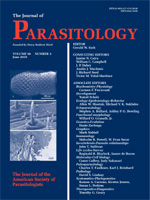Metam sodium (MS, sodium N-methyldithiocarbamate) is a widely used soil pesticide. Fumigation or chemical sterilization of poultry litter containing infectious oocysts could be an effective strategy to block the transmission of avian coccidia. In the current study, the effect of MS on the viability and infectivity of ocysts was investigated. The development of isolated, unsporulated oocysts of both Eimeria tenella and Eimeria maxima was inhibited, in a dose-related manner (IC50 8 to 14 µg/ml), by exposure to aqueous MS. Most treated oocysts failed to develop beyond early stages of sporulation. To determine the effect of MS on infectivity, isolated oocysts of E. tenella, Eimeria acervulina, and E. maxima were exposed for 24 hr to aqueous concentrations of MS ranging from 0 to 1,000 µg/ml. Treated oocysts were inoculated into chickens, and parameters of coccidiosis infection were compared to chickens inoculated with equal numbers of untreated oocysts. In a dose-related manner, MS significantly reduced the infectivity of oocysts with maximum effect observed at a dose of 300 µg/ml. When a mixture of oocysts containing 3 coccidian species was exposed to 300 µg/ml MS, from 0 to 24 hr, infectivity of oocysts was significantly reduced after a minimum of 12 hr of exposure. Treatment of aqueous slurries of litter samples obtained from commercial poultry houses, with 300 µg/ml MS for 24 hr, prevented the sporulation of eimerian oocysts in the litter samples relative to untreated control samples. The results indicate that MS could be used to reduce coccidial contamination of poultry litter.
BioOne.org will be down briefly for maintenance on 17 December 2024 between 18:00-22:00 Pacific Time US. We apologize for any inconvenience.
How to translate text using browser tools
1 June 2010
Metam Sodium Reduces Viability and Infectivity of Eimeria Oocysts
R. H. Fetterer,
M. C. Jenkins,
K. B. Miska,
G. D. Cain
ACCESS THE FULL ARTICLE

Journal of Parasitology
Vol. 96 • No. 3
June 2010
Vol. 96 • No. 3
June 2010




